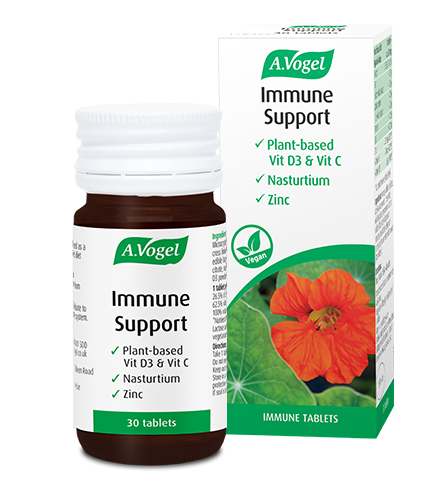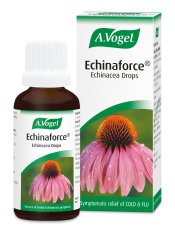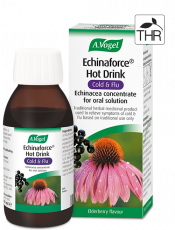What are the best vitamins for the immune system?
A recent A.Vogel survey found that 46.4% of people have experienced a nutrient deficiency at some point over the course of their lives, whilst 40% weren't sure if they had or not.
Some key signs that you are experiencing a nutrient deficiency are regular bouts of colds and flu, or long-lasting viruses. This is because several nutrients are important in keeping the immune system working well so, if you are deficient, illnesses are more likely to crop up.
Three vitamins, in particular, that are good for the immune system include:
- Vitamin C
- Vitamin D
- Vitamin A.
Let's take a look at how these help the immune system and find out how else you can support the immune system.
Vitamin C
Vitamin C has antioxidant properties which are important in keeping the immune system functioning optimally. People who get enough vitamin C are, therefore, more able to fight off infections than those who are deficient.
Consuming high levels of refined sugars may compete with the absorption of vitamin C which, as well as supporting the normal function of the immune system, is very important for maintaining the health of the mucous membranes.1 So, it's a good idea to limit your sweet and sugary snacks and to keep your vitamin C levels topped up with some of the foods I have listed at the end of this blog.
A.Vogel Immune Support Tablets with Vitamin D, Vitamin C and Zinc, 30 tablets
£13.99 (30 tablets) In Stock
Vitamin D
Vitamin D has a role to play in various bodily systems, including the immune system which it helps to keep functioning well. As vitamin D deficiency is a fairly common occurrence across all population groups, this could be a contributing factor in regular bouts of sickness, colds and flu.
Biologically active forms of vitamin D contain calcitriol which acts as a cytokine, a chemical produced by infected cells to help mobilise immune cells into fighting the infection. Low levels of vitamin D are, therefore, associated with lower levels of cytokine activity. This means that, when the body is under attack from pathogens and viruses, it is less able to call on the help of immune cells.
Vitamin D can be especially hard to come by in the winter months when we don't get sufficient access to sun light – a key source of vitamin D. At this time colds and flu can be more abundant so it is especially important to ensure you get enough vitamin D, either through your diet or a gentle supplement.
Vitamin A
Vitamin A is probably more noted for the positive effect it can have on vision and eye health, however, it also has a part to play in enhancing immune function. It is involved in regulating immune responses and processes,2 for example, and helps to protect against colds and flu. This is because it helps to produce white blood cells that protect the body from such infections.
If you fail to get enough vitamin A, it is more likely that you will get sick. So, to keep the immune system functioning at its best, this is an important nutrient to get enough of.
Keep up your nutrient intake…
| Vitamin C | Vitamin D | Vitamin A |
| Watermelon | Salmon | Cheese |
| Kiwi | Liver | Eggs |
| Broccoli | Red meat | Milk |
| Strawberries | Egg yolks | Yoghurt |
| Red & green peppers | Sardines | Liver |
| Brussels sprouts | Mackerel | Salmon |
| Sweet potatoes | Tuna | Fortified low-fat spreads |
| Cabbage | Herring | Mango |
| Winter squash | Fortified breakfast cereals | Carrots |
References
1 https://www.ncbi.nlm.nih.gov/pubmed/16373990
2 https://www.ncbi.nlm.nih.gov/pmc/articles/PMC6162863/
What you said!
We recently ran a poll to find out how many of you take vitamin supplements. We've crunched the numbers and here are the results.
Results: Do you take any vitamin supplements?
As 81.8% of you said you take vitamin supplements, it's obvious that these are popular. Although vitamin supplements can give your immune system an extra boost, it is important to take these alongside a healthy, varied diet rich in fresh fruits and vegetables.







 Looking to support your immune system? Well, look no further!
Looking to support your immune system? Well, look no further!


